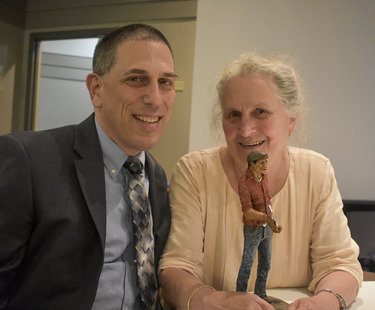Enterprise editor honored for lifetime of grassroots journalism
Melissa Hale-Spencer, long-time editor of The Altamont Enterprise, was recognized earlier this year with a lifetime achievement award from the International Society of Weekly Newspaper Editors.
The Eugene Cervi Award is named for the late editor of the Rocky Mountain Journal in Denver, whom The New York Times called “one of the most outspoken voices in American journalism” after his death in 1970.
The award is presented not for a single brave accomplishment but for a career of outstanding public service through community journalism and for adhering to the highest standards of the craft with the deep reverence for the English language that was the hallmark of Gene Cervi’s writing, the society says, continuing, “The award also recognizes particularly aggressive reporting of government at the grassroots level and interpretation of local affairs.”
The award was presented at the society’s annual convention in Toronto last summer.
Hale-Spencer was nominated for the award by people who have worked with her or been covered by The Enterprise over the years, chief among them Andrew Schotz.
Schotz started his journalism career at The Enterprise, fresh out of the University at Albany. He is now the editor of a daily newspaper in Maryland, The Frederick News-Post.
“Melissa works unceasingly as both editor and reporter — frequently 75 or 80 hours a week, usually across seven days — to cover the news, take pictures, edit reporters’ stories, oversee opinion pages and write editorials,” Schotz wrote.
Enterprise co-publisher Marcello Iaia wrote, “At an age when most people retire, Melissa put her own money in, with her husband and myself, to purchase the newspaper from its longtime owners. When the local daily covered the sale, the subhead read, ‘Paper's outspoken editor of 30 years, reporter buy the Altamont weekly paper.’”
Iaia also wrote, “Melissa’s model of a newspaper also creates community, rather than a locality necessitating a newspaper. She believes that the publication brings disparate people together and pollinates local endeavors.”
Kate Cohen, who started her journalism career at The Enterprise and is now a columnist for The Washington Post, wrote of Hale-Spencer: “She believes that the more people know the better they understand, and the better they understand the more equipped they are to improve their community. She believes, in short, in the importance of serious local journalism, and she has devoted her life to its preservation. Heart, soul, and blood.”
Adam Greenberg, who is married to Cohen and serves on the New Scotland Town Board, wrote, “In my time in town government, while not always enjoying the coverage, I have found Melissa to be fair and thoughtful. In pieces that embrace detail, she informs the public and provides them the information they need to make educated decisions — a critical yet often unmet need in a town our size.”
Jo E. Prout, a longtime Enterprise reporter currently pursuing a doctorate degree in divinity at Duke University, wrote, “She trained me and so many young reporters in the art of expression and community reflection through a journalist’s pencil …. The sheer body of courageous writing she has published is difficult to cull — Muckrack.com, for example, lists 1,624 stories under Melissa’s name, and her dynamic work began decades before links were available.”
Dr. Dennis Sullivan, Editor-in-Chief Emeritus of the Contemporary Justice Review who writes the “Field notes” column for The Enterprise, wrote of Hale-Spencer, “If you meet Melissa, you see in the woman a face that is ready to listen, interested in you and your concerns at the very moment you are sharing them ….
“Some people say we live in an age when every ‘man’ is for himself; in Melissa we find a person whose ears and pen are ready for you and your concerns; she is a master at fostering the dialogue that keeps communities alive.”
Finally, John E. Williams, scribe emeritus for the Old Men of the Mountain, wrote, “I have worked with and known Melissa for 30-plus years and have found her to be one of the most honest people I know. When asked one time what she planned on doing when she retired her reply was ‘I don’t think I will retire; my body runs on ink.’ This is true – if cut she would bleed black …. Her lifelong dedication to the paper has kept it alive for all these years.”
In accepting the Eugene Cervi Award, Hale-Spencer said, “On average in this nation, two newspapers each week are shutting down. Closing. Out of business. There were 120 million newspaper subscriptions at the peak of print, which has shrunk to 30 million.
“This concerns me deeply. As a journalist, I believe it is important to empower citizens by informing them — as accurately and fairly as I know how ….
“While national or worldwide news continues to rivet readers, local news is often unreported or, if reported, unread. Nevertheless, we must persist. We must make our government of the people work.”
This week, Hale-Spencer said, “I remain grateful to our readers who have sustained The Enterprise over these many years and who have been informed and empowered by our coverage.
“I’m also grateful for the work of our two committed reporters, Sean Mulkerrin and Noah Zweifel, for our photographer Micael Koff, for Holly Busch who delivers our papers, for Elisabeth Vines who illustrates my editorials, and for Ellen Schreibstein who notarizes our legals, but most of all I’m grateful for Marcello Iaia who keeps the business running.”
Each year, the International Society of Weekly Editors chooses a Golden Dozen, naming the 12 best editorials with the best of all receiving the Golden Quill.
The contest this year was judged by S tephen Leacock, a Canadian political scientist, teacher, writer, and humorist. Amanda Mendez, editor of the Ozarks’ Howell County News, won the Golden Quill for her editorial on the role of a small-town paper.
Hale-Spencer has twice won the Golden Quill and this year was named to the Golden Dozen for her editorial, “Tax breaks for first responders make sense and save cents in the long run,” which called for the Guilderland School Board to grant a tax exemption for volunteer firefighters, which the board ultimately did.
The judge wrote, “As editorialist Hale-Spencer aptly describes them: first responders are not like the rest of us who run away from danger; they rush toward it. And more often than not the danger they face isn’t obvious. Her research for this column, for example, reveals the stunning array of carcinogens firefighters often ingest or absorb despite every effort to protect them.
“Why then wouldn’t a community alleviate the side-effects of precarious work with financial relief to keep such remarkable people in town? She illustrates comprehensively.”
In accepting the award, Hale-Spencer credited Koff — who is a volunteer firefighter as well as a photographer — for the inspiration.




Congratulations Melissa, what a well deserved honor. Our community is so incrediby fortunate to have you. We moved to Altamont 15 years ago and I have been continually grateful for the vital stream of information and local coverage the Enterprise provides under your helm. You are an inspiration on so many levels. Thank you and Congrats!